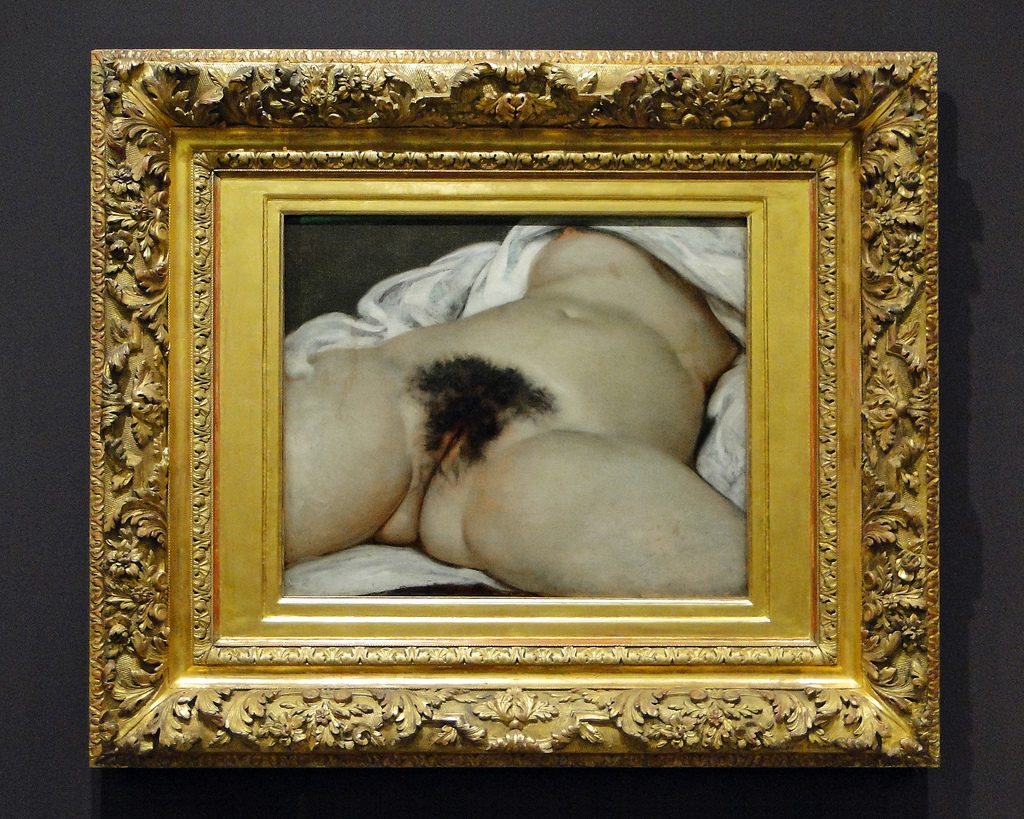Copyrighting obscene work of art. Can one assert copyright over an obscene work of art?
In this regard, the first question which arises is if the author can claim rights over the result of his intellectual effort and can invoke the full protection of the law.
Copyright laws do not contain express provisions banning from their scope works that are deemed immoral.
Therefore, whether it be Gustave Courbet’s L’origine du monde (which finally has found its place in the Quay d’Orsay museum) or a lewd hard-core film, the creation of the work entitles the author to the protection of the law.

Copyrighting obscene work of art. Following this line, limitations to the right to reproduce, represent and disseminate the work come after the work has been created and are justified by reasons of public policy, mostly laws against obscenity.
Similarly, a parallel issue is with works where the content is considered illegal for its subversive or criminal expression (a pamphlet advocating the extermination of a race, a handbook on how to organize a terrorist attack, et caetera). It is a crime to disseminate such works, but copyright is not questioned.
And one can find an analogy with the rights over Adolf Hitler’s writings, which were not declared as non-existing, but were confiscated by the Allies and transferred to the Land of Bavaria, which now holds them. There is, however, a different approach which has found the approval of the courts.
There can be no right over obscene works, and therefore the author cannot invoke the protection of the law. This line of thought, therefore, does not distinguish between infringement of copyright and breach of contract. In the latter case, the denial of enforcement or of damages might be justified by the general refusal of immoral contracts. But in the former case what is denied is the existence of a property (copy)right.
The obvious consequences are that anyone can appropriate himself of the work of another, reproduce it in whole or in part without paying any monies, change, modify or adapt it at his pleasure. The self-proclaimed author would not even have the possibility to claim an indirect protection (typically, passing off) as generally happens with works that do not fall under the notion of works of art, such as games or puzzles.
Although this line of thought does not appear to be attractive, it does have – apart from the approval of some courts – some elements in its favour.
Copyrighting obscene work of art. In the first place one should mention works of which the creation is itself a crime, such as child pornography. Whatever the artistic merits of the author – one can think of photographer David Hamilton – the depiction of children in such a way that satisfies base and paedophile instincts is deemed a crime, and therefore inevitably follows the rules concerning the objects of the crime, i.e. confiscation and destruction.

Just as a criminal chemist cannot invoke any property right over his home-made heroin, in a similar way the author of a paedo-pornographic work cannot assert ownership over it.
The second reason is one of policy. If one has to contrast obscenity and immorality, which try to seep into society under the wide cloak of copyright it is preferable to deny the protection of the law from the outset.
It is much more coherent to dissuade pornographers at the beginning of their economic endeavour, rather than accord them, initially, a right which in practice is, and should be, denied.
Behind this approach there are however some quite obvious flaws.
If the policy is that of banning obscene works it is up to Parliament to set the rules (criminal, administrative, procedural) and have them applied. One might doubt that judicial wisdom is able to grasp the whole complexity of the issue. And at any rate the courts would only have a piece-meal approach.
At best they would act only when some private controversy about the existence or non-existence of enforceable rights arises. The rule would therefore be very similar to that which exists for prostitution services and copyright would be denied only if and when some party should ask for the court’s assistance.
Copyrighting obscene work of art. It has also been suggested that the lack of copyright protection would have a multiplying, rather than curbing effect on the dissemination of the works one aims at prohibiting.
There is a further, more general, objection to denying copyright protection to works that are considered immoral. It is an agreed principle that the standards through which a court or any other public body establishes the ‘immorality’ or ‘obscenity’ of a work are those of the community which the court or the public body represent.
If one considers that copyright is now extended to 70 years after the death of the author, one can easily figure out that protection is denied on the basis of standards that may well be more than a century old. And it is sufficient to re-examine in the light of present day standards the cases in which a work of art has been qualified as obscene to acknowledge that the result would be different now.
If therefore one accepts the view that copyright can also be granted to grossly obscene works, the consequences for contract law are quite obvious.
Copyrighting obscene work of art. Limitations to the rights of the author or the copyright holder must be expressly indicated by legislation and, as with any exceptional rule, must be interpreted stricto sensu. There is therefore a general presumption of legality of the contracts concerning the exploitation of the work and the circulation of its copies. And at the same time protection is given against infringement.
The fact that some forms of dissemination may be forbidden for public policy reasons (typically broadcasting on free-to-air TV) does not validate violation by third parties. This approach is particularly important if applied to on-line sale of pornographic videos.
If these are not protected any business might legitimately get hold of its competitor’s library and start offering it, at a lower price, on the Internet. The end result would be that they would be practically free. This might be a policy goal inasmuch as one wishes to destroy the value of the porn industry, but it should be clearly stated. And there is a further effect on the contracts of those working in the creation of such works (typically porn actors and actresses).
Copyrighting obscene work of art. Abstract from: Zeno-Zencovich, Vincenzo, Sex & the Contract: From Infamous Commerce to the Market for Sexual Goods and Services (Second Edition) (October 23, 2015). Sex & the Contract: From Infamous Commerce to the Market for Sexual Goods and Services (Second Edition), Consumatori e Mercato series, Roma TrE-Press, 2015. Available at SSRN: http://ssrn.com/abstract=2678918
Dandi Law Firm provides legal assistance in Copyright and New Media. Check out our Services or contact Us!





